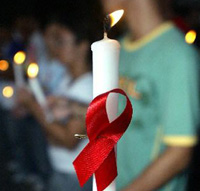
Asia marked World AIDS Day yesterday with free condoms, mobile phone games and flag-festooned rallies aimed at promoting awareness of a disease that kills millions in rich and poor countries each year.
The United Nations launched the annual event yesterday by calling for an "exceptional response" to the threat and said that while adult infection rates had dropped in some countries due to increased use of condoms and changes in sexual behavior, the epidemic continued to grow.
The number of people living in 2005 with HIV, the virus that causes AIDS, had reached its highest level ever at an estimated 40.3 million people, UNAIDS Executive Director Peter Piot said in a message to mark the occasion. Nearly half of them are women.
He also urged countries to invest more. "The lessons of nearly 25 years into the AIDS epidemic are clear. Investments made in HIV prevention break the cycle of new infections. By making these investments, each and every country can reverse the spread of AIDS," Piot said.
In Cambodia, where AIDS has killed 100,000 people and left 70,000 orphans, thousands of people gathered in the capital Phnom Penh to mark the day, many waving flags with safe sex messages.
The country has managed to slow its adult infection rate, but authorities say a conservative Buddhist culture has contributed to the spread of the disease.
"Because of our culture our women are facing barriers to telling their husbands to use condoms," said Dr Teng Kunthy, deputy secretary-general of the National AIDS Authority.
In India, Prime Minister Manmohan Singh was to join student volunteers and ballet dancers to promote AIDS awareness a day after his health minister said many people in large and populous states were being missed out in AIDS counts.
There are 5.13 million people HIV-positive people in India, second only to South Africa which has the world's greatest number of cases.
A private Indian corporate chain operating diagnostic centers launched a premarital HIV check up on World AIDS Day, saying increasing singles having sex in cities resulted in the demand for the service.
"In India, premarital sex is rising. It is not enough anymore to match horoscopes like we traditionally do in India before marriage," said Ameera Shah, vice-president of Business Development of Metropolis Heath Services which has over 200 franchisees in India and abroad.
Official indifference
Health workers in red caps and blue jackets with the words "Stop AIDS" on the back stood in front of Tokyo's Shibuya station conducting surveys about AIDS and handing out packages containing condoms, information about AIDS testing and red plastic bracelets.
The square in front of the station was packed with young people and high school students on their way home from school. When a health worker approached one group of high school boys, all dressed in black school uniforms, they laughed in an embarrassed way and waved her away.
Japan may be one of the world's most advanced nations, but it also a country where AIDS cases have not dropped dramatically. Some experts say cumulative numbers could jump to 50,000 by 2010 due to increased sexual activity among teenagers.
Nearly half of all 17-year-old girls have had sex, up from around 17 percent in 1990. For boys, the figure is 40 percent, nearly double the 1990 figure, Health Ministry data shows.
In Viet Nam, the government issued a directive calling on authorities to crack down harder on drug abuse and prostitution and educate young people about "healthy lifestyles".
Australia said it would donate A$10 million (US$7.4 million) over five years to help fight HIV/AIDS in India and urged people to remain focused on the disease.
(China Daily December 2, 2005)
|

